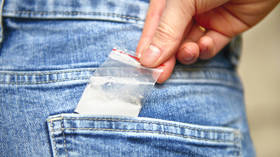Brits could lose passports for using drugs

Recreational drug users in the UK could soon be stripped of their passports or driving licenses under a series of new laws proposed by the Home Office on Monday.
In the document titled ‘SWIFT, CERTAIN, TOUGH New consequences for drug possession,' the Home Office proposes introducing three tiers of punishments for possession of illegal drugs such as cocaine and cannabis.
The penalties vary from being forced to pay for a drug awareness course to being issued with a hefty fine, and could even result in the loss of an offender’s passport and driving license.
“Tier 1: A person should be issued with a fixed penalty notice as an alternative to prosecution, which requires them to attend and pay for a drugs awareness course,” the white paper suggests, adding that if the individual does not attend the course, they will be forced to pay an increased fine.
The second tier suggests that persons caught with illegal drugs could be offered a caution which could include “a period of mandatory drug testing alongside attendance at a further stage drugs awareness course.”
Under the third tier, the person would “likely” be charged for their offense, and, on conviction, could be faced with an exclusion order, drug tagging, passport confiscation, and driving license disqualification.
Home Secretary Priti Patel explained the need for harsher punishments for drug-related offenses by insisting that “illicit drugs are at the root of untold harm and misery across our society.”
She added that more people die every year as a result of drug misuse than from “all knife crime and traffic accidents combined.”
“Drugs also cause enormous harm to children and young people, impacting on their health and their ability to work and learn. The total cost to society and taxpayers is huge too, running close to £22 billion ($26.4 billion) a year in England alone,” she wrote in the document.
Patel stated that the purpose of this newly proposed legislation is to ensure that drug users are “more likely to be caught” and face “tougher and more meaningful consequences.”
“We want to see swift and certain interventions delivered which can deter drug use and, alongside other measures, reduce demand for drugs,” she concluded.
The document sets out a goal of clamping down on the “cohorts of so-called recreational users” and driving down demand for illicit substances. However, it does not seek to address illicit drug use among children or adults with drug addiction.
It also notes the dangers of the drug trade, stating that “too often, individuals who choose to use drugs casually are sheltered from or wilfully ignore the human cost of the drugs trade which is immediately around them. They are putting money into the pockets of dangerous drug gangs and fueling violence, both in the UK and across the globe. We want this to change.“
According to the document, in 2019/20, over three million people in England and Wales reported using drugs in the last year. The Home Office argues that these people were putting themselves at risk, making communities less safe and handing lucrative profits to criminals driving a violent and exploitative supply chain.













